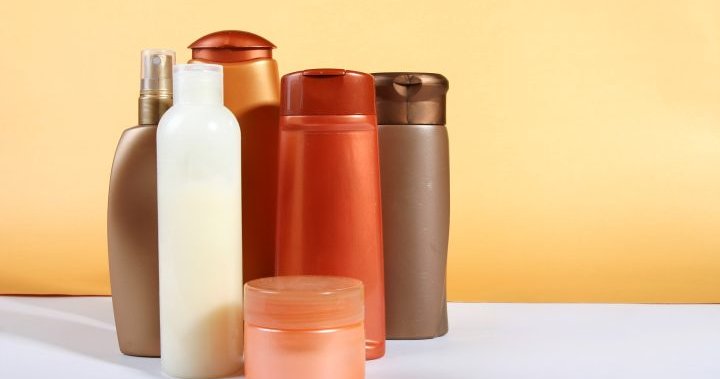Changes in cosmetic labels could bring relief for Canadians with allergies – National | Globalnews.ca
Alisha Minielly was mystified as rashes suddenly started appearing all over her body, including one that persisted on her left leg for six months.
She figured something in her makeup or shampoo could be the culprit and began switching to personal products labelled as having “natural” ingredients but that did not help. Neither did a steroid cream prescribed by a doctor at one of the walk-in clinics she visited because she didn’t have a general practitioner.
A patch test, which had a dermatologist placing small amounts of various fragrance mixes on her back and covering them with patches for five “very itchy” days, revealed she was allergic to a long list of common fragrances used in products ranging from face wash and moisturizer to shampoo, conditioner and hair dye.
Read more:
Allergy season will be short but ‘bad’ in Canada this year, experts predict
The allergens included propolis, which smells like beeswax, as well as nickel, geraniol, limonene, linalool and anise alcohol. The fragrances add floral, citrus, woodsy and other scents, which sometimes mask unpleasant smells. For Minielly, they caused contact dermatitis.
However, learning about the allergens that were making her miserable was only half the battle for Minielly, even after she shunned every product that could possibly cause a rash. She realized she breaks out just from being around others who have used something her body reacts to, restricting her social interactions.
“Now, all my close friends and family know when they see me to not wear cologne or perfume. And to try and limit the fragrances that they’re wearing, like a fragrant shampoo, for example. It’s really hit and miss and it is tough,” she said from New Hamburg, Ont., about an hour’s drive west of Toronto.
Minielly is hoping proposed regulations by Health Canada to require the cosmetics industry to disclose 24 fragrance allergens on product labels will provide some relief for people like her.

The agency is currently doing a 70-day online consultation, ending April 22, of the cosmetics industry and the public as part of a requirement that would have the industry include the 24 allergens on labels. It can currently use the term “parfum” to represent a mixture of substances.
The move would bring Canada in line with the European Union, where that regulation was established in 2005.
Read more:
Dry shampoo recall: More than 100 incidents or injuries reported in Canada so far
“When certain fragrance allergens come in contact with skin, this can sometimes cause or lead to allergic reactions, resulting in irritations such as redness or rashes,” Health Canada said in a statement. “This requirement would allow consumers to be aware of, and avoid, products that contain certain fragrance ingredients to which they may be sensitive, in order to protect their health.”
It said disclosure would be required if the substances are present in a cosmetic at a concentration greater than 0.01 per cent in rinse-off products and 0.001 per cent in leave-on products _ a level “sufficient to protect Canadians.”
Fragrance mixtures may also include trace amounts of other ingredients that fall below this threshold, however it would be impractical to disclose hundreds of them on a label, Health Canada said.
“There are no jurisdictions that require the entire fragrance composition of a cosmetic on the product label.”

Globally, the composition of fragrance mixtures is considered proprietary information.
Minielly is allergic to 13 of the 24 fragrances that would have to be listed on labels and others that will not be included. She said the change would be a good start to inform people about what they’re exposing themselves to.
“It seems like a very basic right but even for people who aren’t allergic they may develop an allergy. And even if they don’t develop an allergy and aren’t allergic it just seems like a basic level of transparency,” she said.
Read more:
Illegal skin-lightening creams pose ‘serious health risks,’ says Health Canada
“Any time you can hold industry to some kind of standard is a good thing.”
Minielly said a lack of education around managing her symptoms, even after she learned about her fragrance allergies, left her vulnerable because fragrances are added to so many everyday products. Much of what she gleaned about her condition and how to protect herself has come from an online support group based in the United States, from where she orders shampoo, she added.
Even products labelled “fragrance free,” “dermatologist tested” and “for sensitive skin” can be problematic for people whose immune systems react to certain ingredients.
Susan Nieuwhof, spokesperson for Cosmetics Alliance Canada, said the trade organization representing the cosmetics and personal care products industry supports the federal government’s proposal.

It’s time that regulations in Canada aligned with those in other countries, including the European Union and the United States, she said.
While Canada imports personal products from other jurisdictions, Nieuwhof said, it also manufactures a significant supply, mostly in Ontario and Quebec, and between 70 to 90 per cent of it is exported to other markets.
“Cosmetics and personal care products are a global industry and, as such, the harmonization of regulations is important to us to simplify trade and protect consumers,” she said in an emailed statement.
Read more:
Health Canada recalls thousands of laundry products over bacteria concern
Cassie Barker of Environment Defence Canada said the group participated in the consultation and has been pushing the federal government to follow the European Union’s model for nearly 20 years so consumers can make informed choices about common products.
“The assumption people have is that if it’s on the shelf, then it’s safe. In reality, our system is post-market regulatory whereby something is sold, someone has a reaction, they have to report that reaction to Health Canada in order for the system to pick up on these kinds of impacts,” Barker said.
However, she called on the federal government to go further than just requiring the cosmetics industry to disclose fragrance allergens.
“Labelling is the floor. We want the disclosure to drive manufacturers to reformulate,” she said, adding ingredients that don’t cause allergic reactions should be used instead.
Health Canada said comments received during the consultation period will be reviewed and considered before the proposed regulations are finalized.
The industry would have two years to disclose the 24 fragrance allergens on labels, it said.
For all the latest health News Click Here




